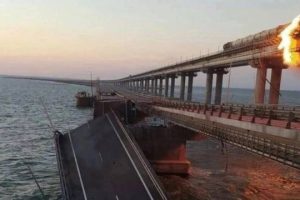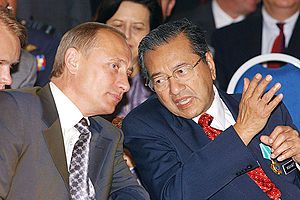President Joko Widodo, who was invited to the G7 Summit held in Germany from June 26, rejected the G7's "accusation of inviting Putin" and made a surprise visit to Ukraine and Russia. President Zelensky replied, "If Putin doesn't appear, he will attend."
The U.S. administration of Biden, whose stomach bugs do not go away, forced another Japan-Indonesia summit meeting in July. President Joko visited Japan this time. According to Japan's Ministry of Foreign Affairs, there was no mention of Ukraine or Russia at the meeting. In desperation, Prime Minister Kishida said that he would deepen cooperation by linking the "free and open Indo-Pacific Initiative" of Japan, the United States, Australia and India with ASEAN's own "Indo-Pacific Outlook", which aspires to reconcile with China. Both can be described as water and oil. During the meeting, President Jokowi, who usually kept a smile and a gentle expression, cast a sharp, cold look at Prime Minister Kishida.
The reason why Indonesia tried to propose the Indo-Pacific concept as an independent concept of ASEAN was that at the end of 2017, the Trump administration clearly declared a new cold war against China. The Joko administration emphasized its relationship with China, and opposed the Quad, a strategic dialogue between Japan, the United States, Australia, and India aimed at containing China. Under these circumstances, India, one corner of the Quad, supported the Indonesian-led ASEAN initiative, saying, "ASEAN leadership is necessary for peace and prosperity in the Indo-Pacific region." The Japanese government and media continue to ignore the move.
■Relentless Threats: Block Putin's participation in the G20
The United States and Britain, obsessed with “expulsion of Putin and Russia from the international community,” have recently indiscriminately crossed the red line laid out by Russia. If the West intensifies the degree of provocation, Russian military action against Ukraine has become tougher and more ambitious. The United States and Britain continue to escalate their accusations against Russia, accusing it of indiscriminate killing of civilians and amplification of attacks on civilian facilities by mobilizing the Western media.
 The attack on the Crimean Bridge on October 8 (photograph) and the gas leak sabotage of the "Nord Stream" undersea natural gas pipeline connecting Russia and Germany on September 26 are typical examples of escalating means. The United States and Europe use the media to propagandize it as “Russia's self-produced false flag operation,” and refuse to listen to Russia's claim that it was a “terrorist attack by a Ukrainian agency (backed by the United States and Britain).” From the standpoint of a third party, I have no choice but to call it a "relentless threat" that blames Russia for all its wrongdoings.
The attack on the Crimean Bridge on October 8 (photograph) and the gas leak sabotage of the "Nord Stream" undersea natural gas pipeline connecting Russia and Germany on September 26 are typical examples of escalating means. The United States and Europe use the media to propagandize it as “Russia's self-produced false flag operation,” and refuse to listen to Russia's claim that it was a “terrorist attack by a Ukrainian agency (backed by the United States and Britain).” From the standpoint of a third party, I have no choice but to call it a "relentless threat" that blames Russia for all its wrongdoings. Underlying the intimidation is the U.S. and U.K. establishment's obsessive devotion to thwarting the Indonesian government's attempt to make Putin's invitation to the G20 summit in Bali on November 15-16.
By any chance, Putin show up in Bali, and shake hands with not only the leaders of the G7 member countries, but also Xi Jinping of China, Modi of India, Erdogan of Turkey, and Mohammed Muhammad of Saudi Arabia, who has begun to distance himself from the United States, has rapidly approached Russia. US and Britain never allow the scene of chatting with them to be reported. This is because the “permanent banishment of Putin”, which had once seemed to have been successful since February 24, when the Russian military began to invade Ukraine, would come to a standstill.
Following the attack on the Crimean Bridge, Russia launched a large-scale strike across Ukraine with missiles and drones. The Russian side claimed that it was "retaliation for Ukrainian terrorism, and that the targets were energy and communications facilities, and Ukrainian military command bases," but as usual, this was easily mishandled. The Western media has extensively reported the impact of bullets on infrastructure such as water supply and electricity, cultural facilities where ordinary citizens gather, and bullet holes in parks, further impressing the world with Russia's lawlessness.
On October 11, the G7 leaders held an emergency online meeting as if they had been waiting for it, and repeatedly criticized that "indiscriminate attacks on civilians constitute war crimes." Despite Russia's accusations of "targeted retaliation," the statement reaffirmed its growing hatred of Russia. There is not even the slightest suspicion that the indiscriminate attacks were “false flag terrorism” by highly trained U.S. and British special forces and foreign mercenary units hiding in Ukraine, and neo-Nazi armed groups such as Azov.
On October 12, the United Nations General Assembly adopted a resolution calling Russia's annexation of four provinces in southeastern Ukraine "illegal and void." Of the 193 member states of the United Nations, 143 voted in favor, 5 against, 35 abstained, and 10 refused to vote. Meanwhile, on March 2, shortly after the war in Ukraine began, the United Nations General Assembly adopted a resolution "condemning Russia and calling for its immediate withdrawal from Ukraine." As a result, 141 countries voted in favor, 5 countries including Russia opposed, 35 countries including China and India abstained, and 12 countries refused to vote. Compared to March, the results for October showed that two countries declined to vote, and two more countries voted in favor. There were basically no major changes. However, the Western media, including Japan, were excited that the number of approval hit a record high.
President Putin, who willingly agreed to attend the G20 meeting with President Joko Widodo, who visited Moscow in June, changed his attitude in response to the worsening war situation. According to Reuters, Russian aide Ushakov said on October 12, "It is still unclear whether Putin will attend the G20 summit. US President Biden said in an interview with CNN on the same day, "There is no reason to meet with Putin at the G20 at this time," suggesting that he would not attend. The possibility of Vice President Harris attending as a substitute is also rumored.

 The attack on the Crimean Bridge on October 8 (photograph) and the gas leak sabotage of the "Nord Stream" undersea natural gas pipeline connecting Russia and Germany on September 26 are typical examples of escalating means. The United States and Europe use the media to propagandize it as “Russia's self-produced false flag operation,” and refuse to listen to Russia's claim that it was a “terrorist attack by a Ukrainian agency (backed by the United States and Britain).” From the standpoint of a third party, I have no choice but to call it a "relentless threat" that blames Russia for all its wrongdoings.
The attack on the Crimean Bridge on October 8 (photograph) and the gas leak sabotage of the "Nord Stream" undersea natural gas pipeline connecting Russia and Germany on September 26 are typical examples of escalating means. The United States and Europe use the media to propagandize it as “Russia's self-produced false flag operation,” and refuse to listen to Russia's claim that it was a “terrorist attack by a Ukrainian agency (backed by the United States and Britain).” From the standpoint of a third party, I have no choice but to call it a "relentless threat" that blames Russia for all its wrongdoings.  [Photo] Prime Minister Mahathir (at that time) talking with Russian President Vladimir Putin who was invited to the 13th Summit of Non-Aligned Nations held in Kuala Lumpur, Malaysia in 2003
[Photo] Prime Minister Mahathir (at that time) talking with Russian President Vladimir Putin who was invited to the 13th Summit of Non-Aligned Nations held in Kuala Lumpur, Malaysia in 2003